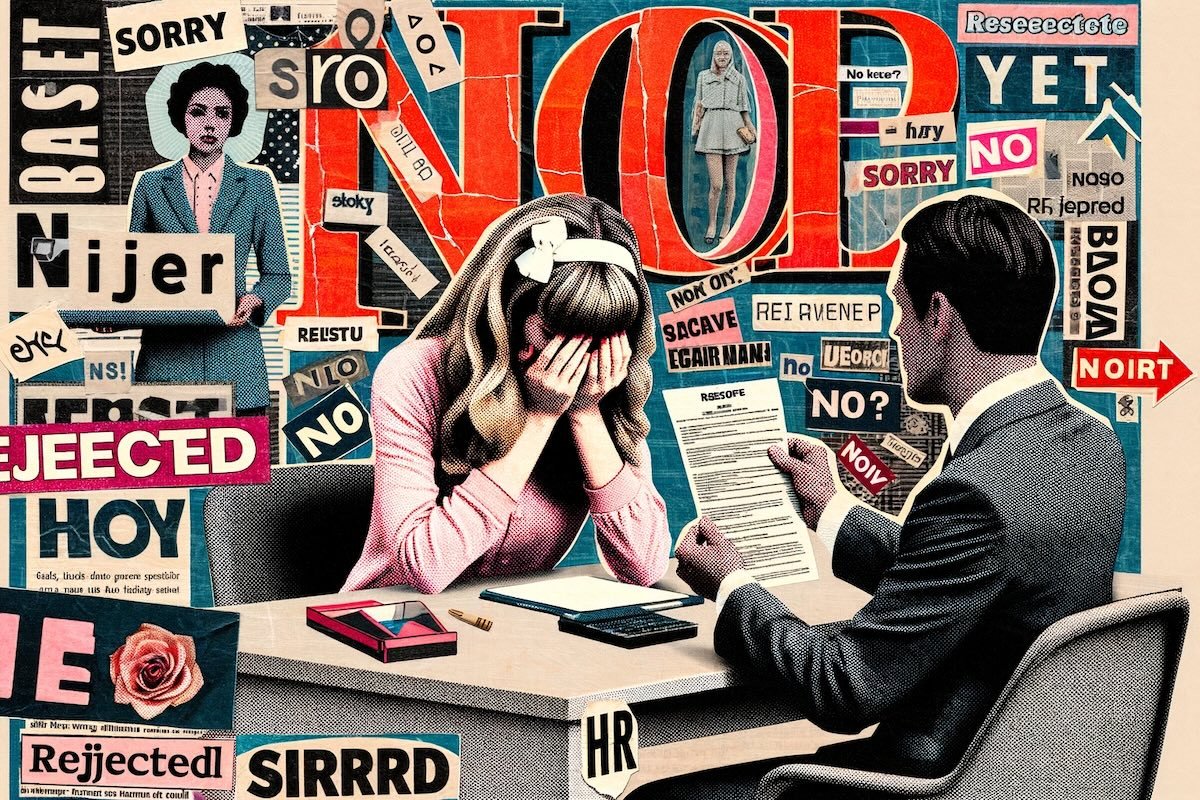We've all had a bad interview, whether it was our own fault or not.
As job seekers, we want to leave the best impression before, during, and after every interview. Sometimes, the first step to
acing an interview is knowing the common interview mistakes to avoid.
We already know some of the basic interview killers to avoid. Don't trash-talk your old boss or company, even if they all deserve it. Don't mention that there's another job you really, really want. Don't take out your phone during the interview, which would seem obvious, but it happens.
Since we already know how to spot some of the
signature red flags and signs of a bad interview from the company's end, let's also ensure that we are not making avoidable interviewing mistakes that leave us wondering
why we didn't get the job.
Table of Contents
- Interview Mistakes to Avoid Before the Interview
- Interview Mistakes to Avoid During the Interview
- Interview Mistakes to Avoid After the Interview
Interview Mistakes to Avoid Before the Interview
You didn't think you could fail an interview before you even arrived, did you? Well, you can. Some of the worst job interviews are owed to one common factor: a lack of preparation.
With these interviews, you typically have one shot. If you want the job, it's more than worth it to do your homework.
Whether it's a phone interview, a follow-up, or a final interview, make sure you prepare. Once prepared, shake your nerves loose with these tips to help you
calm your nerves before an interview.
1. You Don't Research the Company
According to LegalJobs, this is one of the most common reasons cited when hiring managers and recruiters talk about bad job interviews.
In fact, job interview statistics have shown that 47 percent of job candidates failed an interview because they didn't know much about the company.
This is a frustrating interview blunder because researching a company is so easy. The inability to explain what a company does in a sentence or two is going to lead to a very short interview.
Make sure you have a good answer prepared for questions about the company, including:
- What do we do here at [COMPANY]?
- What is it that interests you about [COMPANY]?
- What do you know about the history of [COMPANY]?
Know the answers to these questions. They are easy to find. Before going to
any interview, create a checklist of research to do, including:
- Read + follow the company's LinkedIn page (and research others who work there, especially those in leadership roles).
- Read + follow the company's social channels, including Twitter, Instagram, TikTok, YouTube, and wherever they are active.
- Read the company's website. If they have a newsletter or a mailing list, join it.
Thoroughly researching a company before an interview has another huge added benefit. It will help you prepare
thoughtful questions of your own. It will also help you in the "chit-chatting" parts of the interview, where you can share anecdotes, media mentions, and other valuable insights you've found.
Pro Tip: Create and complete a research checklist whenever you apply to a particular job. If the hiring manager notices that you follow and engage with their content, that could be your first good impression.
2. You Know Nothing About the Person Interviewing You
This point builds on the previous tip. Know who your interviewer is beforehand. If you have a
phone interview prior to an in-person, make sure to ask who you will be speaking with and their job titles.
You already know the next steps. Head to their LinkedIn and know their career. If you're interviewing multiple people, do the same. This shows that you're engaged, that you're doing the upfront work, and, to be completely frank, it's flattering.
On that note, flattery never hurt anyone. If you admire some career transition or point of inflection in their career, tell them about it!
Just keep it professional. If their Instagram is a personal account, you don't want to be the candidate who accidentally double-hearts a four-year-old photo. Steer clear of their personal life, but make it your business to know the highlights of their professional life.
3. You Didn't Prepare for Common Interview Questions
At this point, we all have the cheat sheet for interviews. You know the questions they're going to ask. You might dread the difficult questions and you're probably sick of talking about
your biggest weakness, but you're ready.
Here are some of the most-asked interview questions to help you prep.
Interview Mistakes to Avoid During the Interview
It feels like you've already done so much work, but the interview hasn't even started. The preparation is half the battle.
You know the company in and out. You have follow-up questions prepared, you know your relevant experience, you know the specific skills to highlight and you're ready to rock.
If you need to
quickly calm your nerves, take a walk around the block, listen to your favorite pump-me-up jam, and get ready to get it!
4. You're Late to Arrive
We all have bad days where nothing goes right. Our train gets stuck on the tracks or we're driving in traffic behind a trash truck or a school bus. The day of your interview cannot be one of those days.
The cardinal rule of making a good first impression on anyone is simple. Don't be late. Tardiness just sets a bad tone. Regardless of the reason, it shows a lack of respect for everyone's time.
Even if you have to stage a trial drive to your interview location, don't be late.
Pro Tip: The tardiness issue, like everything in an interview, goes both ways. If your hiring manager has had communication slip-ups followed by their own tardiness, it's a huge red flag for you, too.
5. You Pretend You Know an Answer That You Don't
This is the most guaranteed way to fail an interview. It can feel so deflating to come up blank when asked a technical question. But, don't BS your way through a question. You're likely to do more harm than good.
If you don't know the answer, you have two options:
- You can respond with, "I'm not sure I know the answer to that question."
- You can respond with, "I'm not sure I know the answer, but may I share what I think it might be?"
If you're completely stumped, just go with option number one. Sometimes, interviewers are sneaky and ask you a stumper on purpose. They want to see if you will try to fudge an answer. Is it a jerk move? Kind of. Take note if a "gotcha!" moment isn't your speed. This may not be the job for you.
In other cases, you just might not know the answer because your skills aren't up to par. You're going to answer lots of questions. Unless this particular question is a make-or-break question, it's fine to admit that you don't know the answer.
In short, anything is better than lying in an interview.
6. Too Much Name Dropping
Yes, you can mention a connection in common or a colleague that you worked alongside in an interview. But, keep it cool.
Nobody likes a name-dropper, so keep all of your stunning
networking connections to yourself, at least for now. You might find a natural place to mention an impressive colleague in your next interview. Focus, instead, on your actual interview. Give a good impression by sharing your skills and achievements, not the who's who of your industry.
7. You're Too Rehearsed
We want you to prepare for your interview so that you present your best self. Don't mistake this as a prompt to memorize canned answers to interview questions.
Loosen up. You can show your personality while you give valuable insights into your future in this role.
Many of the most
interesting interview questions allow you to tell more about yourself, who you are as a human, and maybe even get the interviewer to share their own fun facts, too.
Pro Tip: This is exactly why we're huge fans of the mock interview, especially a recorded one. Use a practice interview to shake your nerves off, perfect your language, and ditch any robotic elements.
8. You Have No Questions Prepared, Especially at the End of the Interview
Knowing how to steer a conversation is just as much a skill as being able to answer tough questions. Don’t let the conversation take you down a path where you can’t shine.
Remember, the interview is for you, too, We know that it can be overwhelming to share so much information about yourself—all while you're taking in new information, too. That's why it's so important to prepare the questions that you want to ask in an interview beforehand.
Coming without your own questions can give the impression of disinterest or a lack of preparation.
Pro Tip: Let there be some silence in an interview. The biggest mistakes in interviews happen when we move too fast. Consider your interview a long-distance run instead of a sprint. When an interviewer asks a question, consider your answer instead of racing to fill the silence. Anyway, the quiet moments are never as long as you imagine.
9. You Use Too Much Jargon
Don't show up to an interview to speak only in acronyms and esoteric phrases. Aside from
jargon being an irritating and transparent device, it might also come off as condescending to your interviewer.
However, if your interviewer is a big jargon person and you're connecting through your talks of sunsetting, unpacking, circling back, and taking one another's temperatures, then go off, we guess?
10. You Let a Small Mistake Derail You
If you start to answer a two-part question or
an open-ended question and find yourself lost in a thick word soup, pause. Ask the interviewer if they can repeat the question or give you a quick moment to refocus your answer.
It's easy for a small mistake to snowball and sabotage an entire interview. Don't let it happen. If you finish addressing a question and realize that you gave a bad answer, fix it. Do your damage control upfront instead of listening to your
impostor syndrome echoing in the back of your skill for the remainder of the interview.
You have the chance to address small mistakes, brush them off, and proceed. It will show serious confidence and resilience.
Interview Mistakes to Avoid After the Interview
You've mastered every answer, right down to the final question. You've shared your impressive accomplishments, you shook off a tiny mistake, and you proved that you're a great fit for this particular position.
You did it.
Once the interview is over, is it really over? Nope. In fact, we'd argue that the most important element of an interview comes right after you shake hands to leave.
11. You Didn't Send a Post-Interview Thank You Note
If you didn't send
an interview thank you note within 24 hours of an interview, it's our belief that you didn't finish your interview at all.
12. You Didn't Follow Up (If You Didn't Hear)
We've all heard stories of the post-interview ghosting. However, sometimes hiring managers are busy hiring for multiple roles, waiting for other decision-makers to weigh in, or experiencing some other type of roadblock.
If you don't hear back after your thank you note—and after the notice period the hiring manager communicated—feel free to write a follow-up to your thank you.












